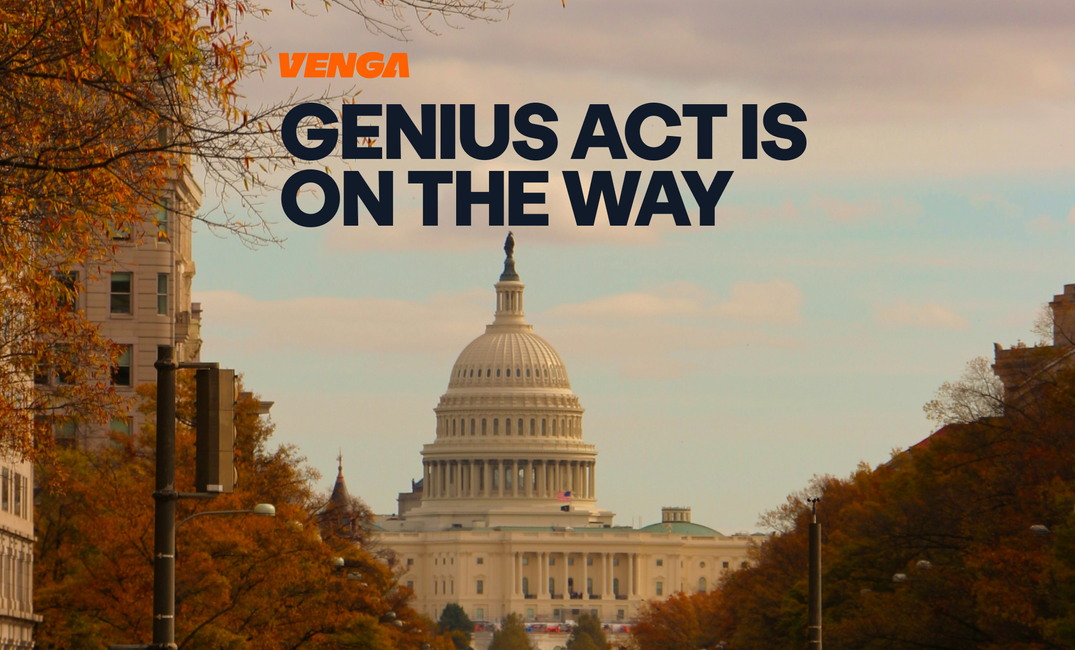Table of Contents
Crypto in the U.S. has always been in a legal gray area (kind of like the Wild West), especially when it comes to stablecoins. No real federal rules have been set, just some state-wide regulations with a whole lot of uncertainty.
But that’s finally starting to change as the GENIUS Act is coming to set a clear legal path ahead. This new bill is to implement nationwide rules for stablecoins in the U.S.
Let’s take a closer look at what’s going on and why this matters for crypto, fintech, and anyone watching the future of finance.
Why is it Needed?
Right now, stablecoins in the U.S. are living in legal blur with some states having their own rules (like New York’s BitLicense), but there’s no single federal framework to set rules on how stablecoins should be issued, backed, or managed.
That causes big institutions to hesitate going into stablecoins while letting some sketchy projects operate under the radar, and ultimately have the U.S. fall behind other countries or regions that already implemented related regulations.
While the European sets MiCA, and Asia countries build strong regulatory paths, the U.S. is finally catching up.
So… What’s the GENIUS Act?
The GENIUS Act (yes, that’s the actual name) is a bill that is to lay down regulations for stablecoins at the federal level.
If adopted, the GENIUS Act would:
- Require stablecoins to be fully backed 1:1 with “safe” assets (examples of such being cash or U.S. Treasuries).
- Allow banks and fintech companies to issue stablecoins (if they get licensed).
- Set clear rules for audits, transparency, and AML (anti-money laundering) compliance.
This bill would put an end to the regulatory guessing games and allow any organization pursuing stablecoin-related activities, or heading in this direction, to operate with defined rules.
What’s Going on Now?
The U.S. Senate just passed the GENIUS Act with 68 votes in favor and 30 against and is now heading to the House. However, some modifications could still happen as lawmakers are debating whether to add stronger restrictions to avoid conflicts of interest. And this doesn’t come from nowhere!
Trump is backing this bill hard and hasting to receive it passed on his desk asap. But, there is a major concern that relies on the benefits that the Trump family could get from it, as rumours say they are to launch their own stablecoin company.
As you can imagine, and as always in politics, there are critics about this initiative. Some are troubled by this potential self-enrichment and conflicts of interest which could lead further debates to tighter restrictions such as the ban of politicians from getting profits of stablecoin companies.
On the other side of things, the GENIUS Act also has many supporters who think this is exactly what the US, to set clear rules ahead to support innovation while protecting users at the same time.
And What’s Next?
If the GENIUS Act becomes law, we could see big tech and finance players launching their own stablecoins (Meta may come back in the crypto game but not for LIBRA this time), stablecoin payments integrated into our daily apps, online store checkouts, or even traditional banks. In short, stablecoins could become mainstream and the U.S. could turn into one of the global leaders in stablecoin-related innovations.
This could be a turning point for crypto adoption!
Disclaimer: The content provided in this article is for educational and informational purposes only and should not be considered financial or investment advice. Interacting with blockchain, crypto assets, and Web3 applications involves risks, including the potential loss of funds. Venga encourages readers to conduct thorough research and understand the risks before engaging with any crypto assets or blockchain technologies. For more details, please refer to our terms of service.
